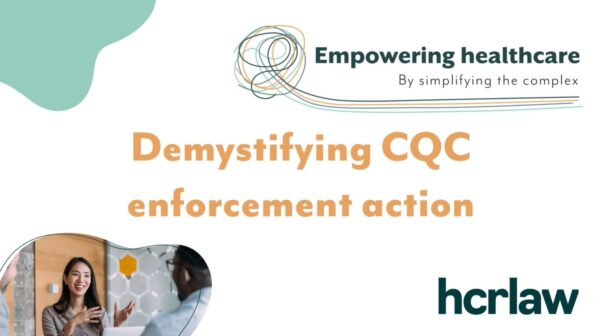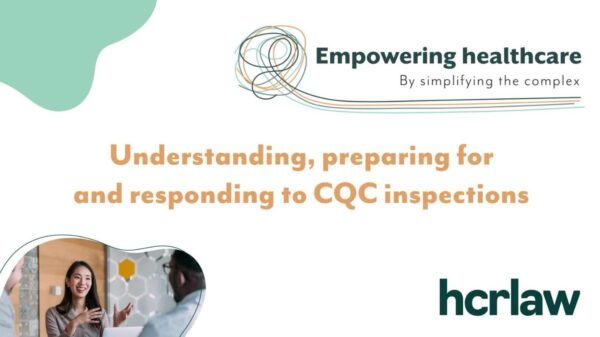

As all doctors will be aware, receiving a letter from the General Medical Council (“GMC”) can be a daunting experience. However, receiving a letter from the GMC confirming that a complaint has been raised against you by a patient, and the GMC are now investigating can be a frightening experience.
Whilst some doctors decide to bury their head in the sand and pretend that nothing has changed, others are actively contacting their medical indemnifier/insurer and ascertaining if they can obtain assistance or seeking independent legal advice at the first available opportunity.
‘Why seek advice at such an early stage?’, you may ask? The answer is simple. The earlier a doctor seeks advice, the earlier they can start preparing their case receive legal advice specific to them.
The fact remains that doctors work hard to become qualified, and all patient complaints should be treated seriously. This is especially the case for those subject to GMC consideration where there can be potential adverse repercussions for a doctor’s practice.
Failure to communicate
Even though patient complaints subject to GMC investigation may differ in complexity and severity, a common theme running through them is often an alleged failure to effectively communicate with patients. This not only impacts doctors but also all other allied healthcare professionals working at the coalface and providing care to patients.
Whilst communication skills are a fundamental bedrock of being a doctor, each practitioner’s communication style is unique. In turn each patient’s perception of that Doctor, and reaction to them and what they say, is also subjective.
Therefore, a direct, no-nonsense speaking doctor who responds to a patient’s concerns may be regarded as showing a lack of compassion by the patient, whilst one who continues to listen to a patient’s worries but repeats earlier advice given may be perceived as dismissive of the patient’s concerns.
Other examples of communication failures we have seen include a doctor being allegedly brusque with patients and a failure to obtain full consent before examination. With effective legal advice, we assisted these doctor(s) to effectively respond to the Rule 7 letters received and the Case Examiners determined that no further action was required.
As a direct result of all or any of the above, alongside any other potential failings alleged, the patient will then submit a written complaint to the GMC. This is subsequently reviewed against their threshold and accepted for investigation where the threshold is met.
Good medical practice
As doctors will already be aware, domain two of Good Medical Practice 2024 (“GMP”) covers ‘Patients, partnership and communication’ and specifically states that doctors must ‘treat patients with kindness, courtesy and respect’ meaning:
- Communicating sensitively and considerately, particularly when sharing potentially distressing issues about the patient’s prognosis and care (paragraph 23(a))
- Listening to patients, recognising their knowledge and experience of their health, and acknowledging their concerns (23(b))
- Explaining reasons for the options offered (and the options not offered) and any recommendations made (23(d))
- Making sure information provided to patients is clear, accurate and up to date, and based on best available evidence (30)
- Being considerate and compassionate to those close to the patient and be sensitive and responsive in giving them information and support (37).
In addition, domain three entitled ‘Colleagues, culture and safety’ states, in brief, that doctors must ‘treat colleagues with kindness, courtesy and respect’ (paragraph 48) whilst domain four, entitled ‘Trust and professionalism’, states that doctors must be honest and trustworthy, and maintain patient confidentiality in all their professional written, verbal and digital communications (paragraph 88).
Rule 7
Rule 7 of the General Medical Council (Fitness to Practise) Rules Order of Council 2004 stipulates that the GMC will write to a doctor notifying them of allegations raising concern regarding their Fitness to Practise (“FTP”), requesting written representations within 28 days from the date of the letter.
The GMC will also provide the doctor with a copy of the documents they rely on, e.g., the patient complaint and supporting documents – this is known as a ‘Rule 7 Letter’.
As doctors will already be aware, the Case Examiners are the gatekeepers of FTP complaints and their task is to determine how a complaint should be disposed of. In doing so, they apply the following test, known as the ‘realistic prospect’ test to complaints:
- Is there a realistic prospect of the facts being found proven at an FTP hearing
- Is there a realistic prospect of impairment being found at an FTP hearing justifying action being taken by an FTP Panel.
Where the Case Examiners response is affirmative to both, the case will be referred to an FTP hearing. Where the response is in the negative, the Case Examiners will choose an alternative option.
This can include taking no further action, adjournment of the matter to make further enquiries, or the imposition of a Warning or Undertakings as and where relevant.
Rule 7 Response
We have frequently seen communication allegations raised against healthcare professionals and find it is often the presence of these, amongst other clinical allegations, that result in a complaint being referred to an FTP hearing.
This is because Case Examiners, after the Rule 7 Letter has been issued and responded to by the doctor, are unable to determine disputes of fact without supporting corroborative documentation. Therefore, the only recourse available to the Case Examiners is to refer the complaint to an FTP Hearing for full ventilation of the evidence.
As such, where communication failings are alleged within the Rule 7 Letter and are strongly refuted by the doctor, we have recommended to our clients that they provide an account to the Case Examiners setting out their version of events. These have referenced and enclosed witness statements from colleague(s) who overheard what was actually said.
In doing so, this has provided the corroborative evidence required for the Case Examiners to close the case with no further action. Further documentation that can assist the Case Examiners at this stage, and prevent them leaning in favour of referral to an FTP hearing, can include references from colleagues regarding communicate style, testimonials from patients where appropriate and evidence of targeted communication Continuing Professional Development (“CPD”) undertaken.
Naturally, there may be instances where a doctor admits that their communication was sub-par on that occasion and we would recommend to our clients that they submit evidence of remediation to the Case Examiners. This evidence should demonstrate that this is not their usual practice, they have the necessary insight into their past failing or error, and they have already remediated their communication technique and enclosed verifiable CPD to this effect.
In doing so, a doctor is able to put forward submissions to the Case Examiners, via their legal representatives, that although there is a likelihood of the facts being found proven at an FTP hearing, current impairment is unlikely to be found. Therefore a referral to an FTP hearing should not be made by the Case Examiners.
Support
Naturally, any FTP investigation can be stressful for a Doctor and instructing an independent legal representative or relying on a medical indemnifier/insurer can provide the required level of support and reassurance during this challenging period as well as the necessary legal advice.
However, not all doctors have access to support and the GMC therefore set up the Doctor Support Service. The Doctor Support Service is completely independent of the GMC and offers complimentary emotional and confidential support to doctors currently under an FTP investigation.
The Doctor Support Service can also provide someone to accompany a doctor to their FTP hearing for up to two days providing them with the necessary emotional support. To contact the Doctor Support Service, the relevant contact details are as follows: 020 7383 6707 or [email protected].
Conclusion
Naturally, and as stated above, good communication skills are a fundamental part of being a doctor and conducting regular communication CPD, amongst other soft skills, will always stand a doctor in good stead. It will also prove invaluable at any stage of an FTP investigation, as well as improving a doctor’s day to day communication with patients.










